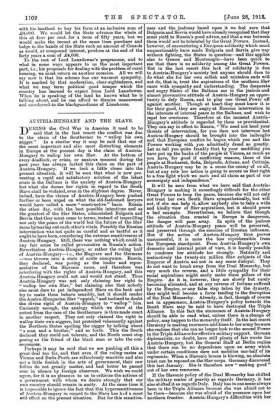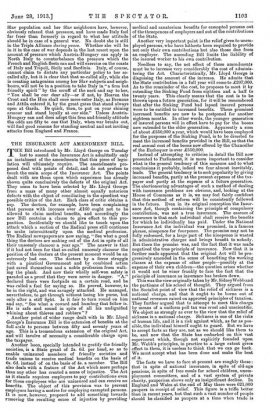AUSTRIA-HUNGARY AND THE SLAVS. D URING the Civil War in America
it used to be said that in the last resort the conflict was due to the claim of the Southerner to " wallop his own nigger." In a similar way it may be said that one of the most important and also most disturbing elements in Europe at the present day is the claim of Austria- Hungary to wallop her own Slay. At the bottom of every deadlock, or crisis, or anxious moment during the past year has always lurked this claim on the part of Austria-Hungary. If we look a little closer into the present situation, it will be seen that what is now pre- venting a rapid and satisfactory solution of the latest crisis in the Balkans is the anxiety of Austria-Hungary lest what she deems her rights in regard to the South Slays shall be violated, even in the slightest degree. Never, indeed, have the claims of Austria-Hungary been pushed further or been urged on what the old-fashioned lawyers would have called a more " constructive " basis. Russia the other day, with the best possible intentions and as the greatest of the Slav States, admonished Bulgaria and Servia, that they must come to terms, instead of imperilling not only the peace of the world but the future of the Slav races bytearing out each other's vitals. Possibly the Russian intervention was not quite as careful and as tactful as it ought to have been, considering the extreme sensitiveness of Austria-Hungary. Still, there was nothing which could in any fair sense be called provocative in Russia's action. Nevertheless Austria-Hungary, or rather the ruling half of Austria-Hungary—i.e., the Magyars and the Germans —was thrown into a state of acute annoyance. Russia, they declared, was posing as the leader and repre- sentative of the Slavonic races, and therefore was interfering with the rights of Austria-Hungary, and this Austria-Hungary could not and would not stand. Thus Austria-Hungary was not only claiming her right to " wallop her own Slav," but claiming also that nobody else must dare to pat independent Slays on the back and try to make them behave sensibly, lest it should render the Austro-Hungarian Slav "uppish," and inclined to doubt the divine right of Austria-Hungary to " wallop " him. Curiously enough, the analogy which we drew at the outset from the case of the Southerners is thus made exact in another respect. They not only claimed the right to wallop their own niggers, but protested vehemently against the Northern States spoiling the nigger by talking about " a man and a brother," and so forth. This the South declared they could not tolerate, and the North must stop posing as the friend of the black man or take the con- sequences.
Perhaps it may be said that we are pushing all this a great deal too far, and that even if the ruling castes at Vienna and Buda-Pesth are ridiculously sensitive and also not a little foolish in the arts of government, their raw follies do not greatly matter, and had better be passed over in silence by foreign observers. We wish we could agree, for it is no pleasure to us to criticize the actions of a government with whom we desire strongly that our own country should remain in amity. At the same time it is impossible to ignore the fact that this hypersensitiveness of Austria-Hungary in regard to the Slays has had a most evil effect on the present situation. But for this sensitive- nese and the jealousy based upon it we feel sure that Bulgaria and Servia would have already recognized that they must yield to Russia's good advice, and that a war between them would not be tolerated by the Great Powers. Instead, however, of encountering a European solidarity which must unquestionably have made Bulgaria and Servia give way without fighting, the States in question—and this applies also to Greece and Montenegro—have been quick to see that there is no solidarity among the Great Powers. But in the last resort this lack of solidarity is due to Austria-Hungary's anxiety lest anyone should dare to do what she for her own selfish and mistaken ends will not do, that is, treat the aspirations of the southern Slav races with sympathy and understanding. The desperate and angry States of the Balkans see in the jealous and almost provocative attitude of Austria-Hungary an oppor- tunity to defy Russia, and to play one Great Power off against another. Though at heart they must know it is for their good, they are angry at Russian intervention in the interests of internal peace in the Balkans, and wish to repel her overtures. Therefore at the moment Austria- Hungary's attitude is regarded by them as providential. They can say in effect to Russia, " We need not heed your threats of intervention, for you dare not intervene lest Austria-Hungary should be brought into the imbroglio and that European conflict be begun which you and the Powers working with you admittedly dread so greatly. Let us tell you quite frankly that by your meddling you have put up the backs of the people at Vienna, as much as you have, for good if conflicting reasons, those of the people at Bucharest, Sofia, Belgrade, Athens, and Cettinje. Austria-Hungary may be in a sense the enemy of us all, but at any rate her action is going to secure us that right to a free fight which we each and all claim as part of our sovereignty and independence."
It will be seen from what we have said that Austria- Hungary is making it exceedingly difficult for the other Great Powers to keep the peace, because she will not only not treat her own South Slays sympathetically, but will not, if she can help it, allow anybody else to take a wide and kindly view of Slav aspirations, lest it should prove a bad example. Nevertheless, we believe that though the situation thus created in Europe is dangerous, the danger will pass away. In spite of the jealous attitude of Austria-Hungary peace will be preserved, and preserved through the exercise of Russian influence. But if the action of Austria-Hungary thus proves unsuccessful, it is none the less reprehensible from the European standpoint. From Austria-Hungary's own domestic and internal point of view, it is hardly possible to condemn her attitude too strongly. Naturally and instinctively the twenty-six million Slav subjects of the Emperor of Austria are not in any sense disloyal. They do not want to break away from the Dual Monarchy, but very much the reverse, and a little sympathy for their racial aspirations might easily make them pillars of the Empire. As it is, however, they are slowly but surely becoming alienated, and at any reverse of fortune suffered by the Empire, or any false step taken by the dynasty, they might well become a force tending to the disruption of the Dual Monarchy. Already, in fact, though of course not in appearance, Austria-Hungary's policy towards the South Slays may be said to have destroyed the Triple Alliance. In this fact the statesmen of Austria-Hungary should be able to read what, unless there is a change of policy, may happen to the monarchy itself. In the last resort Germany is making enormous additions to her army because she realizes that she can no longer look to the second Power in the Triple Alliance for effective military support. German diplomatists, no doubt, have still plenty of fair words for Austria-Hungary, but the General Staff at Berlin realize that there can be no dependence upon an army which under certain conditions dare not mobilize one-half of its regiments. When a Slavonic breeze is blowing, no absolute trust can be reposed on the Slav corps. Germany discovered this last January. She is therefore now " making good" out of her own resources.
If the Slavonic policy of the Dual Monarchy has shifted the military centre of gravity as regards Germany, it has also shifted it as regards Italy. Italy has in one sense always been in the Triple Alliance because she was afraid not to be there—because she was afraid of the pressure upon her northern frontier. Austria-Hungary's difficulties with her Slav population and her Slav neighbours have, however, obviously relaxed that pressure, and have made Italy feel far freer than formerly in regard to what her attitude should be in case of a general war. No doubt she is still in the Triple Alliance during pace. Whether she will be in it in the case of war depends in the last resort upon the amount of pressure which Austria-Hungary can apply in North Italy to counterbalance the pressure which the French and English fleets can and will exercise on the coasts of Italy and Tripoli, Sicily and Sardinia. Italy, of course, cannot claim to dictate any particular policy to her so- called ally, but it is clear that that so-called ally, while she is creating antagonism among her Slav subjects and neigh- bours, will not be in a position to take Italy in " a firm but friendly spirit " by the scruff of the neck and say to her, " You shall be our dear ally—or if not, by Heaven the Croat and the Hun shall once more enter Italy, as Brennus and Attila entered it, by the great gates that stand always open at Garda. Be quick, then, to put on your shining armour and stand loyally at our side." Unless Austria- Hungary can and does adopt this firm and friendly attitude the odds are fifty to one that Italy, when war breaks out, will find good reasons for standing neutral and not inviting attacks from England and France.



























































 Previous page
Previous page